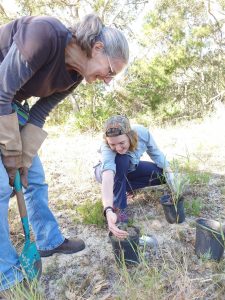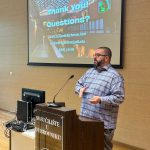Telling Florida’s Stories, a Report for America Corps Member Brings Insight and Passion to UF
Lenore Devore, B.S., Journalism 1984
This story originally appeared in UF News on Dec. 10, 2024.

When Tropical Storm Debby affected Florida in the summer, there were very few emergency notifications available in Spanish throughout the state.
This reality got 22-year-old Rose Schnabel’s wheels turning, and the young journalist – a Report for America corps member and the inaugural staffer on the University of Florida College of Journalism and Communications’ new Florida Environment & Ag Desk at WUFT – started listening to community leaders’ concerns.
“I started researching a project about Florida’s language-access laws and Alachua County’s language-access policy,” she said. “It wound up turning into a full investigation into emergency communications in about 20 North Central Florida counties and how each emergency management unit handled that – if they have interpreters, if they have a language line, if they publish any information on social media in Spanish. Since Florida law doesn’t require it, often the answer was no.”
The story ran in Spanish on Noticias WUFT and in English in several other statewide outlets through the Florida Climate Reporting Network. It was one of Schnabel’s first undertakings at WUFT – a PBS member television station and UF service in Gainesville – which she joined on July 8, just months after earning bachelor’s degrees in biology and Spanish at Indiana University.
WUFT created the Florida Environment & Ag Desk with funding from the UF President’s Office as part of a long-term project to build trust with rural audiences, help quench Florida news deserts, and expand student opportunities to cover the environment and agriculture.
Schnabel’s credentials – with her specialization in journalism and Spanish-language programming – made her an ideal fit for the job. And Report for America – a national service that places journalists in local newsrooms to report on under-covered issues – assigned Schnabel to the position for at least two years, with the opportunity to renew for a third.
“I felt like [the Florida language-access laws story] was an important story to tell. After that, I heard really positive feedback from the community; people read it and were glad it was being covered,” Schnabel said. “The deputy director of the Department of Justice’s Civil Rights Division saw it and posted it on LinkedIn. It was cool to see this article was having an impact even outside the state of Florida.”
Florida is new territory to cover for Schnabel. Raised in Noblesville, Indiana, Schnabel grew up on a small family farm, and the experience shaped her appreciation of nature and agriculture – a passion she brings to her current role. Bilingual since elementary school, she further pursued her love of Spanish during a semester abroad in Madrid, Spain, as well as a fellowship at El Nuevo Dia in San Juan, Puerto Rico.

Now Schnabel is putting her multilingual skills to good use. She hopes her WUFT stories will have an impact, from helping Floridians understand small farmers to exposing pressures on land use and development in Central and North Central Florida.
“I’ve covered a few stories on proposed developments in Alachua and how they could impact cave divers and water quality as well as native plants and species,” Schnabel said. “Florida has so much cool nature and springs, and so many things that make it wild and unique, and people want to come see it, either as tourists or permanent residents. But, in doing so, it’s destroying those very things they are coming to see. I’m very aware that, with so many people coming to Florida, it’s changing the landscape of the state.”
Schnabel has learned to lean on the people who blazed the environmental journalism trail in Florida, including Cynthia Barnett, the college’s director of climate and environment reporting initiatives. In addition to reporting for WUFT.org, Schnabel has enjoyed working on the radio alongside David Barasoain, a news manager in the college’s Innovation News Center.
“Cynthia has a poster advertising one of her classes that says, ‘Get your boots muddy,’ and my boots are muddy,” Schnabel said. “I’ve rappelled into a sinkhole with a source to cover cave diving, I’ve kayaked on the Ocklawaha River with Cynthia’s class, and I got to eat green peanuts straight from the field in Monticello [Florida]. Any time I can take the opportunity to leave the newsroom, as much as I love it, I get my boots dirty.”
Schnabel has gotten her boots dirty in farm fields from Florida to Georgia, deepening WUFT’s reporting on agriculture with stories on peanut farming and hurricanes, and the expansion of citrus growing in the state’s northern counties. She is also helping UF journalism students cover more stories on farming and the environment.
“I feel fortunate to be based out of UF because I can sit in on classes, talk with professors, and interact with students,” she said. “And, being in Florida, I’ve been so in awe of the natural beauty and the wealth of environmental things to cover here.”
Category: College News, Environmental News
Tagged: Environment and Ag Desk Report for America Rose Schnabel
Subscribe to our News Digest


